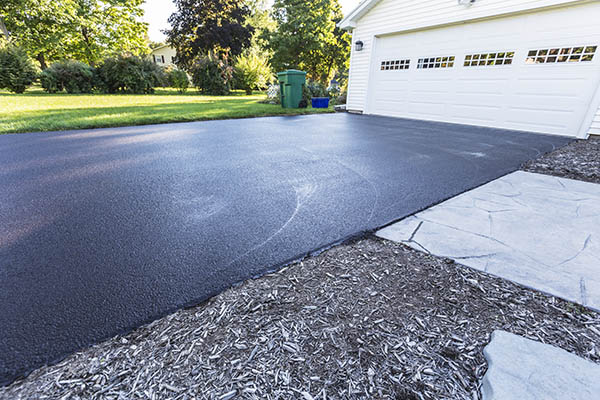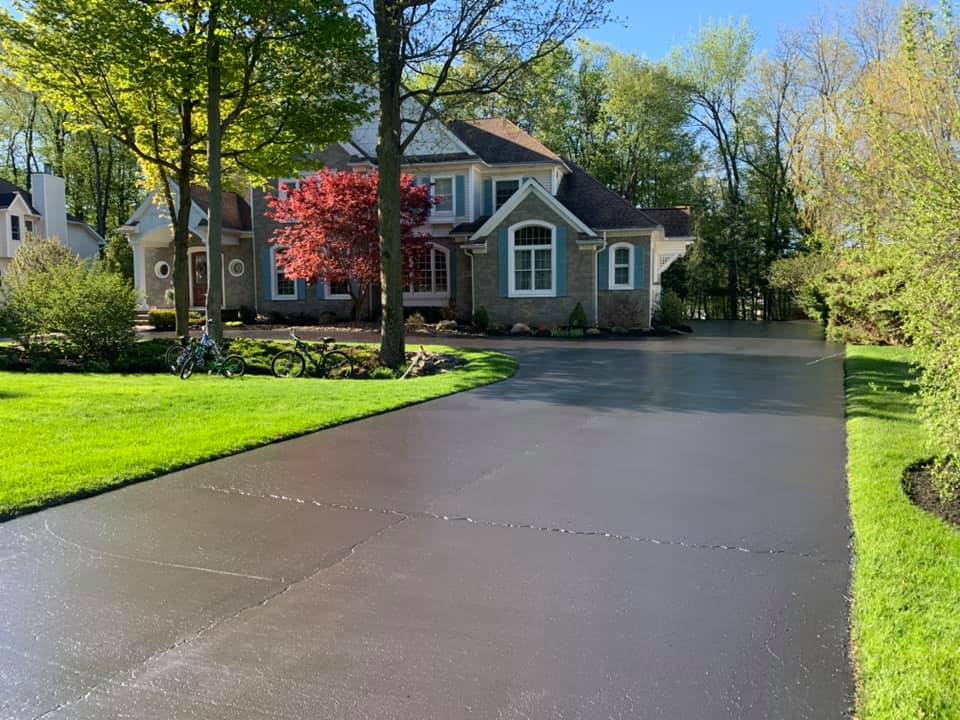Raise Security and Charm: Angled Parking Area Solutions with Asphalt Sealing
Raise Security and Charm: Angled Parking Area Solutions with Asphalt Sealing
Blog Article
Warm Mix Asphalt: A Sustainable Solution for Pavement
Warm Mix Asphalt (HMA) has actually emerged as a leading sustainable option for pavement remedies, providing a myriad of ingenious technologies and environmental advantages. As the demand for green building techniques expands, exploring the subtleties of HMA's sustainability can supply important insights into the future of sidewalk solutions.
Ecological Benefits of Hot Mix Asphalt

Furthermore, Warm Mix Asphalt helps to alleviate urban warm island effects. Its dark color soaks up sunlight, reducing the quantity of heat showed back right into the environment contrasted to lighter-colored pavements. This can reduce ambient temperature levels in metropolitan areas, lowering the need for a/c and eventually reducing power intake.
Furthermore, Hot Mix Asphalt adds to improved stormwater administration. Its porous nature allows water to recharge and infiltrate the pavement groundwater materials, minimizing drainage and the threat of flooding. These environmental benefits make Hot Mix Asphalt a sustainable choice for paving highways and roadways.
Energy Performance in HMA Production
Is power efficiency a critical consider the manufacturing of Hot Mix Asphalt (HMA)? Absolutely. Power plays a considerable function in the production of HMA, impacting both price and environmental sustainability. One key element of power effectiveness in HMA production is making use of warm mix asphalt (WMA) modern technologies (hot mix asphalt). WMA permits the blending and placement of asphalt at reduced temperature levels compared to standard warm mix asphalt, leading to decreased energy intake during manufacturing. This procedure not just lowers fuel usage but additionally decreases greenhouse gas discharges, making it a much more eco-friendly choice.
In addition, developments in plant modern technologies have led to even more energy-efficient HMA production processes. Modern plants are developed with attributes like recycled asphalt pavement (RAP) processing capabilities, efficient heater systems, and enhanced insulation, all adding to power financial savings. By maximizing energy use in HMA manufacturing, the sector can lower its carbon footprint while keeping premium pavement products. Power effectiveness is, therefore, a critical factor to consider in ensuring the sustainability of Hot Mix Asphalt production.
Recyclability of Hot Mix Asphalt
The recyclability of Warm Mix Asphalt (HMA) is a crucial aspect of its sustainability and long-lasting ecological effect. HMA is among one of the most recycled products in the United States, with over 100 million lots of reclaimed asphalt pavement (RAP) being reused yearly in brand-new sidewalk building and construction. Reusing HMA supplies a number of ecological benefits, such as reducing the need for virgin materials, reducing energy usage during production, and reducing the amount of waste sent to garbage dumps.
The procedure of recycling HMA entails grating the existing sidewalk, squashing it into smaller items, and mixing it with new accumulation and asphalt binder to create a recycled mix. In general, the recyclability of HMA plays a considerable function in advertising lasting techniques within the pavement industry.

Long-Term Performance of HMA
Asphalt sidewalks demonstrate longevity and durability over a prolonged period, mirroring the long-lasting performance of Hot Mix Asphalt (HMA) The long life of HMA can be credited to its ability to stand up to rush hour tons, extreme weather condition conditions, and the impacts of aging. Studies have shown that properly designed and effectively constructed HMA pavements can last for two decades or more with routine maintenance. The secret to making best use of the long-lasting performance of HMA exists in making use of premium materials, adhering to finest practices in construction, and executing efficient maintenance strategies. Correct drainage, routine examinations, and timely repairs are important for protecting the structural stability of HMA sidewalks over time. In addition, developments in HMA innovation, such as making use of polymer-modified binders and warm mix asphalt, have further boosted the sturdiness and longevity of HMA sidewalks. By focusing on top quality building and upkeep practices, HMA remains to confirm itself as a sustainable and cost-efficient service for long-lasting pavement framework.

HMA: Sturdiness and Sustainability
Showing both toughness and sustainability, Hot Mix Asphalt (HMA) has come to be a foundation in the building and construction of resilient sidewalk infrastructures - regrading. HMA's durability originates from its ability to endure heavy tons, rough climate condition, and high web traffic volumes, making it a trusted selection for roadways, freeways, and airport runways. The composition of HMA, which typically includes aggregates, binder, and filler, plays an important function in improving its durability and resistance to tear and wear
Moreover, HMA's sustainability exists in its recyclability and energy-efficient manufacturing process. The capacity to recycle redeemed asphalt pavement (RAP) in new HMA blends minimizes the need for virgin products and lessens the ecological effect of pavement construction and maintenance. Additionally, the energy efficiency of generating HMA depends on its reduced blending temperatures compared to various other pavement materials, causing lowered power consumption click reference and greenhouse gas discharges.
Verdict
In verdict, warm mix asphalt (HMA) supplies a lasting service for pavement with its eco-friendly qualities. HMA's recyclability, energy efficiency in production, and long-lasting sturdiness make it an environment-friendly option for roadway construction. By saving natural sources, decreasing waste, and decreasing greenhouse gas discharges, HMA plays an essential duty in promoting sustainability in infrastructure growth. Its capacity to alleviate metropolitan heat island effects further emphasizes its significance in developing eco mindful and resistant pavement systems.
HMA is one of the most recycled materials in the United States, with over 100 million tons of recovered asphalt pavement (RAP) being reused yearly in new sidewalk building and construction.The procedure of reusing HMA involves milling the existing sidewalk, crushing it into smaller sized items, and mixing it with new accumulation and asphalt binder to produce a recycled mix.Asphalt sidewalks show resilience and durability over an extended period, reflecting the long-term performance of Hot Mix Asphalt (HMA) Additionally, developments in HMA modern technology, such as the usage of polymer-modified binders and cozy mix Recommended Site asphalt, have actually helpful site additionally improved the toughness and long life of HMA sidewalks. The capacity to recycle redeemed asphalt sidewalk (RAP) in brand-new HMA combinations decreases the demand for virgin products and reduces the environmental impact of pavement building and construction and upkeep.
Report this page